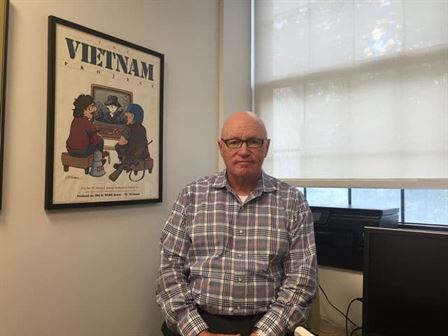
Harry Haines is not only a professor at the School of Communication and Media, but also a Vietnam Veteran Chanila German | The Montclarion
Harry Haines is well-known for his contribution as a professor in the School of Communication and Media at Montclair State. However, before becoming a professor, Haines served in the Vietnam War after being drafted into the Army. In the month of September, he sat down in his office with Chanila German, Feature Editor, to retell the experience.
It was 1969 when I received the letter. All of my belongings were packed into my car, ready for the long drive to Jacksonville, Florida, where a comfortable job and apartment awaited me.
As a journalist, I kept up with the news, but I never gave it much thought. I always told myself that I was safe, that they would not want me. Why would they? I was nearsighted in one eye, and farsighted in the other. Plus, I’m gay.
At the tender age of 23 years old, I was drafted into the Vietnam War, and nothing that I thought would save me did. I passed my physical exam even with my poor eyesight, and the army was unable to discriminate against me because they refused to believe my sexuality. I was angry, and that showed when I went for training. I had a chip on my shoulder because I didn’t want to be there. The frustration with my situation only worsened when I started talking to combat veterans who were returning from the war. They educated us more than any newspaper or television broadcast at home.
To anyone with enough sense, which we all had, it became clear that the United States was never going to win this war. We had the technology that allowed us to keep killing people, but that didn’t guarantee victory. It’s one of the reasons why I joined the anti-war propaganda movement while in the army. I was a professional writer, and I used it to my advantage. I had become a member of an underground newspaper started by a GI. Again, I thought I was safe even though I was doing this while being a uniformed soldier.
However, we were soon infiltrated and busted by the army. A month later, I went off to Vietnam. Anyone that said they were not frightened was a fool. It was a terrifying experience. Everyone there knew that Americans were dying in a war that had no end game. The enemy was wearing us thin.
They were strategic, even without the technological advances that the United States had. Their tactic was to kill as few people as they could, while not backing down from the fight. They held on, hoping to tear down our willpower.
It eventually worked. In 1970, a widespread refusal of orders started to occur. What this meant was an increasing number of units refused to do what their commanding officers told them to do. Soldiers are trained to follow orders, and when they no longer do, things quickly become dangerous. We all had unauthorized weapons to protect ourselves. I had a knife and rifle, even though I was not a part of the combat unit. I was as far away from the fighting as anyone could be, while still being in Vietnam.
My job was to keep injured soldiers calm on their journey to the medics, and through the patients, I saw the real effects of the war.
After I got back from the war, I felt the effects, too. I suffered from post-traumatic stress disorder from my time in the war and was unable to find work with the army on my résumé. I was living in New York with millions of jobs around me, but nobody wanted a veteran. There was too much resentment about the war.
Then a friend suggested I take the army off my résumé, and I listened. Within that same week, I found work at CBS.


